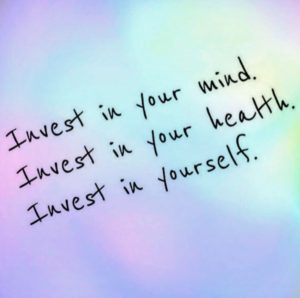AnxietyPath is a safe community environment supported by professional counselors. We are a free self help destination to receive support and guidance for recovery from anxiety and phobias
Self-Care Offers Many Benefits For Recovery
 If you have read a few of my previous posts, you will likely notice that self-care is a reoccurring theme that I often go back to.
If you have read a few of my previous posts, you will likely notice that self-care is a reoccurring theme that I often go back to.
The reason for bringing up the topic of self-care so often is that it plays an extremely important role in creating recovery.
When I refer to self-care I am referring to doing something that helps you. Such as exercise, consuming adequate amounts of water, eating healthy foods, and even getting enough sleep.
Often times I see self-care tips suggesting watching television or indulging in snack foods. When it comes to recovery from anxiety disorders, the last thing I would ever suggest is a passive activity or in any way allowing your emotions to dictate your behavior.
Self-care for recovery from anxiety disorders works in various ways. First, the “thing” that you do for yourself should in some way help improve your physical state of being.
You see, there is a real connection between the way our bodies feel and our mind feels. And vice-a-versa as well, when the mind feels one way, our bodies will respond accordingly. So by getting the body feeling good will naturally and normally help improve our state of mind.
The other benefit from engaging in self-care is that it allows an opportunity to approach life from an intellectual stance, as opposed to only an emotional stance. I also speak often about “emotional drifting” and “living intellectually”. Emotional drifting is what allows our emotions to run unchecked, and this fuels our anxiety.
The way to slow this emotional drifting is to purposely and intentionally live your life the way you need to, and not necessarily the way that “feels” best.
For instance; often people will say “I know I should exercise, but I just don’t feel like it”. Or, when it comes to practicing tools I hear all the time “I forgot”.
Not doing something that you know you should is often pushed off as being lazy. In some cases, I believe there may be a bit of laziness involved. But when it comes to people suffering from anxiety, I believe it is more of a case where we allow our emotions to dictate our behavior.
Even the act of forgetting something is often misunderstood in many cases. Yes, it is true that we may have many distractions in our life that cause us to overlook things, but is it likely someone forgot that they want to recover? Is it likely that a person forgets they have the anxiety, to begin with? Of course not. This too becomes an example of how we allow our emotions to steer the course of our lives.
The way to overcome this emotional drifting is to make a decision intellectually; not how you feel, but rather based on what you know is best for yourself and then following through with it.
Self-care offers the perfect opportunity for this to happen. We know we need to consume more water through the day (or whatever the task is), then we need to do it regardless of how we feel.
When I was creating recovery what I did was write myself little notes and put them around my apartment. I would even use tape to stick the notes in places that I could not avoid seeing them.
The interesting thing about creating a change of any kind, and specifically recovery from an anxiety disorder, is that it is created by making a decision. When we remember that we need to practice our tools or engage in self-care, whatever it is; when we remember it, this is the opportunity that we make a decision. Do we act emotionally, or intellectually? How do we respond? This is a very important moment. It is at this moment that we can learn to empower ourselves. When we can face our emotions and not cater to them. This is how self-care builds empowerment, which leads to confidence, which are the fundamental ingredients for recovery.
So the little notes that I wrote myself helped to remind me what needed to be done based on decisions I made intellectually. After I was reminded of them then I had to make a decision. When presented with this decision is where recovery can begin.
Now in all fairness, I must say that very often my decision was based on my emotions and I made plenty of excuses not to do my practice or self-care. I would meet my counselor once a week and every week she would ask me “did you practice this week”, and towards the beginning of my recovery the answer was mostly “no”. I was an expert at making excuses and finding reasons why “this week” just wasn’t right.
This is why I always say “never give up” and “persistence”. Simply because eventually, on occasion I made a decision to actually follow through with my practice. And that’s how change started happening. The beginning of recovery had started.
As always, “small, manageable steps” to start. We don’t have to do everything all at once, but rather pick one area of your life that needs attention and work towards implementing change in that one area.
And be patient with yourself. Change can be difficult under the best of circumstances. So we have to treat ourselves with gentle kindness. We do have to hold ourselves accountable, but we also have to accept that this is a process. Do what you can today, be appreciative of your accomplishments, and tomorrow try it all over again.
Never give up! Persistence!
Fear To Fearless
Categories
© 2020 AnxietyPath Powered by G SOUL INC